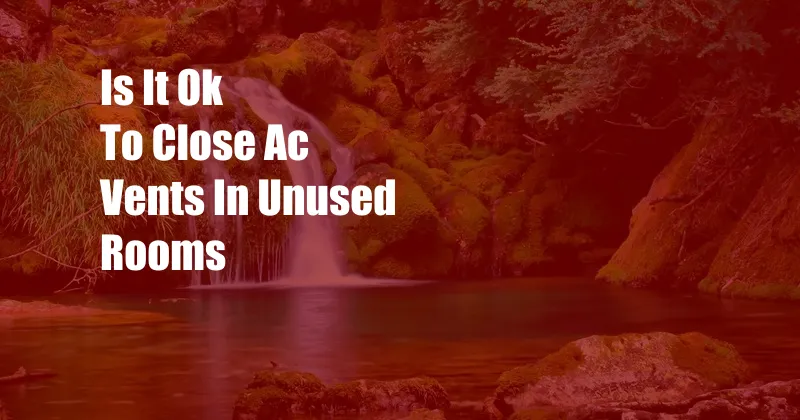
Is It OK to Close AC Vents in Unused Rooms?
When I first moved into my small apartment, I was determined to save money on my energy bills. This meant turning off the lights when leaving a room, unplugging appliances to avoid standby power usage, and wondering if closing AC vents would help me use my AC more efficiently.
If you’re also wondering if closing AC vents is an effective energy-saving technique, this article will delve deep into the subject, exploring its potential benefits and drawbacks. By weighing these factors against your specific needs and circumstances, you can make an informed decision about whether or not to close AC vents in your home.
The Effects of Closing AC Vents
Let’s begin with the basics: what happens when you close AC vents? As you might expect, closing an AC vent restricts the flow of cool air to that particular room. This can lead to several consequences, including:
Increased Pressure on AC System
When an AC vent is closed, the air in the ductwork is forced to flow through a smaller area, increasing the air pressure within the system. This can put strain on your AC unit, reducing its efficiency and potentially shortening its lifespan.
Reduced Efficiency and Comfort
Closing AC vents reduces the airflow to a specific room, which can make it feel warmer. As a result, your AC unit may have to work harder to maintain the desired temperature throughout the house, consuming more energy and leading to higher energy bills.
Uneven Cooling and Humidity
Closing AC vents can lead to uneven cooling throughout your home. The rooms with closed vents will be warmer than those with open vents. This temperature difference can cause uncomfortable living conditions and increase the risk of condensation and humidity problems.
When to Close AC Vents
In general, it’s not recommended to close AC vents in unused rooms. The potential drawbacks outweigh any potential benefits. However, there are a few exceptions to this rule:
Short-Term Use
If you’re only going to be out of a room for a short period (e.g., a few hours), you can close the AC vent to minimize the amount of cooled air that escapes. However, be sure to open the vent before you return to the room to avoid creating an uncomfortable environment.
Addressing Specific Cooling Issues
In some cases, closing AC vents can help address specific cooling issues. For example, if a particular room is consistently too cold, you may want to close the vent in that room slightly to reduce the amount of cool air flowing in.
Expert Advice and Tips
Here are some expert tips and advice to keep in mind when deciding whether or not to close AC vents:
Consult an HVAC Professional
Before making any changes to your AC system, it’s always best to consult with a qualified HVAC professional. They can assess your home’s specific needs and make recommendations on the best way to use your AC vents.
Consider Zone Control
If you have a multi-zone HVAC system, you can use zone control to adjust the temperature in each room independently. This eliminates the need to close AC vents and allows you to enjoy comfortable temperatures throughout your home.
FAQ on Closing AC Vents
Here are some common questions and answers about closing AC vents:
Q: Will closing AC vents save me money on energy bills?
A: No, closing AC vents is not an effective way to save money on energy bills. It can actually increase your energy consumption and lead to higher bills.
Q: Can closing AC vents damage my AC unit?
A: Yes, closing AC vents can put strain on your AC unit and potentially shorten its lifespan.
Q: When should I close AC vents?
A: It’s generally not recommended to close AC vents. However, you may close vents for a short period to minimize cooling loss or address specific cooling issues.
Conclusion
Closing AC vents in unused rooms can seem like a quick and easy way to save energy. However, the drawbacks outweigh the benefits.
If you’re looking to reduce your energy consumption and improve your home’s comfort, consider exploring other energy-saving measures, such as upgrading your insulation, installing a programmable thermostat, or getting a home energy audit. Consult an HVAC professional for personalized advice and solutions.
Is there anything else you’d like to know about closing AC vents? Let us know in the comments below.